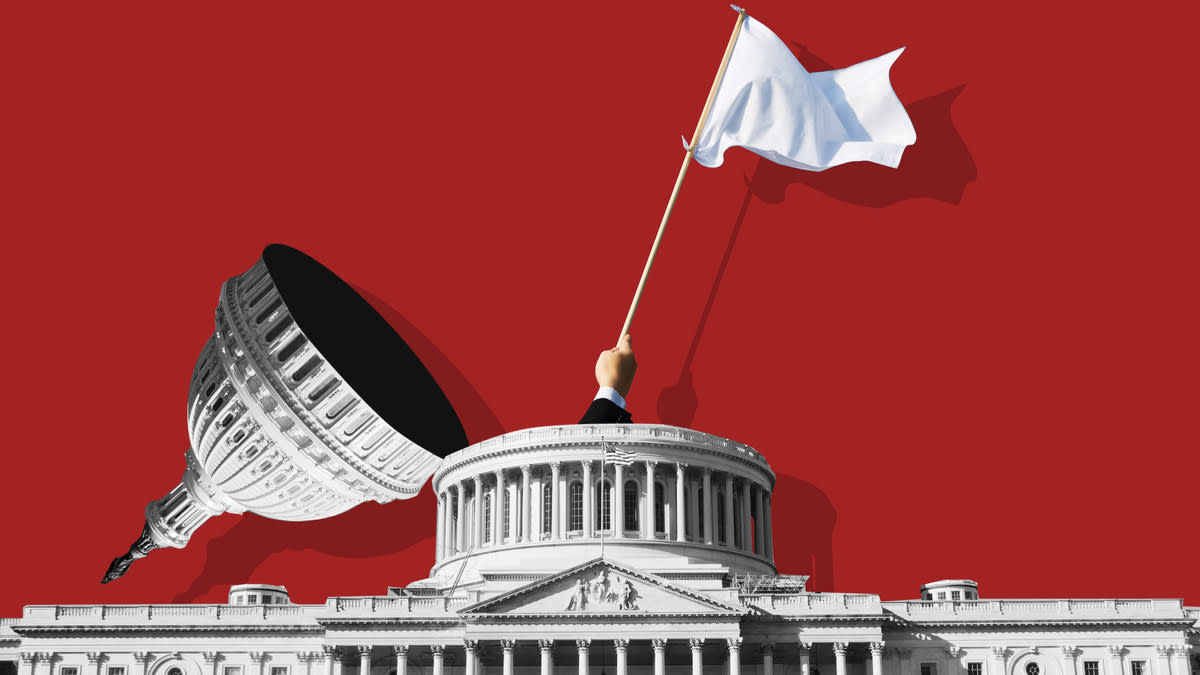I decided I needed to come watch the Senate vote itself into constitutional darkness, and the republic one step closer to fasco-monarchism. So I rounded up one of the Beast credentials Friday afternoon and sped down to Capitol Hill.
I revere this place. I used to, anyway. I remember that when I was about 14, my older sister got a job on the Hill. On the House side. In the Rayburn House Office Building, for those of you who know such things. When we visited, I just thought she was doing the most glamorous, important work in the world. Later, I worked on the Hill, too, in the Longworth Building. I was out of college then, but still young enough to walk around the place starry-eyed. The ornate floors and ceilings, the busts of all those great men, the massive paintings of our formative moments, those weird secret little passageways in the basement of the Capitol that only the truly initiated could learn to navigate. I thought I was in the most important place on Earth. And in fact, except I guess for the White House, I was.
I still get humbled when I go to the Senate. You can’t sit in that chamber, if you’ve read some history, and not be overwhelmed at the thought of the things that have happened there. Of course, once you’ve read some more history, you know that—certainly in the Senate, which was designed to second-guess and tap (or slam) the brakes on progress—more of those things were bad than good.
So, around 4:45 p.m., in I walked. The Senate press gallery is, if you’re watching it on TV, right above where the House managers and Donald Trump’s attorneys stood. In other words, they’re the worst seats in the house, in a way, because you can’t see the people arguing the case. You just hear their voices. You look out at the senators’ desks, but because of the sight lines and the way they’re arrayed, you can’t even see all of them.
As I walked in, Adam Schiff was talking, finishing up his final plea before the vote on witnesses. He concluded. Mitch McConnell muttered something. And right around 5 p.m., we started doing what political reporters do more than anything else: standing around waiting to see what would happen next. This is particularly true of the Senate, which likes to shroud its doings in mystery. It adds to the awe. In this case, it actually meant that they themselves didn’t know what was coming next.
They mill about on the floor. As you may know, there’s a Republican side, and a Democratic side, in terms of where they sit. But, partisan intensity notwithstanding, they do socialize together on the floor. Kyrsten Sinema, in an eye-catching all-white ensemble, wandered over to the Republican side (some will see a metaphor there) and started talking with Mitt Romney. He was really bending her ear about something. His rationale for his coming vote? Federalist 63? The awesomeness of the car elevator in his La Jolla manse garage? Who knew?
There was a huddle in the middle of the floor that involved Chuck Schumer, so you knew something was going down there. John Cornyn was involved. And John Thune. That seemed like it had to be a negotiation. Every so often, things would get loud. This would cause those of us in the press gallery to stand up and crane our necks. “Why is everybody standing up?” one woman asked. “Because everybody else is,” someone said. Then we’d sit down, and things would quiet down.
Oh look, here comes Bernie. He’d been in the Democratic cloakroom, but now he ambled out to the floor. He looked around and finally walked about 15 feet to join a conversation among Democrats Richard Blumenthal and Sheldon Whitehouse and Republican Roy Blunt. But he looked bored. Actually, they all looked bored. And tired.
I surveyed the visitors galleries, to the sides and across from us. Whoa, there was Sherrod Brown, up in the gallery! What was he doing up there? A couple more seconds’ study confirmed that he was talking to his wife, the magnificent journalist Connie Schultz.
By 5:25, journalists were wondering what the hell was next. At 5:35, out of nowhere, McConnell spoke. We will vote, he said, on the question of witnesses.
You will surely know that around noon, The New York Times broke yet another stunning development in the John Bolton part of this saga. According to his book, Trump asked him to call Volodymyr Zelensky and implore him to meet with Rudy Giuliani. It would be as if a witness in a murder trial leaked that someone asked him to go buy a gun and some ammunition and meet him on a certain dark street corner on a certain night.
Did the jurors want to know? The clerk started calling the roll. As fate would have it, Lamar Alexander came first. A tall man, once thought of by many as someone who could have been the Republican leader and would have been far preferable to McConnell in terms of guiding the Senate toward compromise; bedecked this night in a vermilion sweater under his suit jacket; retiring, and thus facing none of that re-election pressure that keeps Republicans in line. “No!” he bellowed.
On down the list it went. The way these roll calls work is that each senator’s name is called is alphabetical order. He or she stands and says a simple “aye” or “no.” The men tend to button their suit coats for the occasion. They know when they’re next, so as Joe Manchin stands to say “aye,” for witnesses, Ed Markey also stands, ready for his turn.
Susan Collins said “aye.” But Lisa Murkowski muttered a meek and fairly quiet “no.” After her, Romney provided the second Republican “aye,” and good for him and Collins: Whatever else they’ve done, and whatever their motives, history will record them as having stood for at least this much principle. But in six minutes, by 5:41, it was done. By 51-49, the Senate voted not to have witnesses.
In doing so, it voted to endorse Donald Trump’s idea that if the president did it, it was legal. It voted to endorse Alan Dershowitz’s legal theory that anything the president did in furtherance of his re-election was fine. And implicitly, it voted to affirm the principle that the executive could do whatever he wanted, and the legislative branch would do nothing. It voted itself into irrelevance in the moments that mattered, all for a man they surely know to be a criminal.
To you and to me, this is a dark development in this country’s history. The precedent this lays down is unimaginable, and the implications for this year’s election staggering. We’re sure to learn this fall that Trump has done something to re-elect himself that is either illegal or plainly immoral or both, but the United States Senate has now affirmed that whatever he does will be fine. Principle is dead. Ideological solidarity is the only thing that matters.
As I left, another journalist and I got on an elevator with some Senate pages. I think seven of them, five men and two women. They were wearing their blue blazers and their name tags that identified them by party. “Oh,” said the other journalist. “I didn’t know there were Democratic pages and Republican pages.”
Neither had I, so I looked up at the name tag of the young woman closest to me, and then some others. They were Republican pages. I decided to make light of the situation. “So the real question,” I said, “is how many inter-party page romantic relationships there are.” I smiled. It was clear, I thought, I was half-joking.
I expected a jokey answer from one of them. But nobody said anything. A few seconds later, as the elevator was descending and I had returned to staring down at my phone, one of the male pages whispered, slowly and deliberately: “Zee-roh.”

